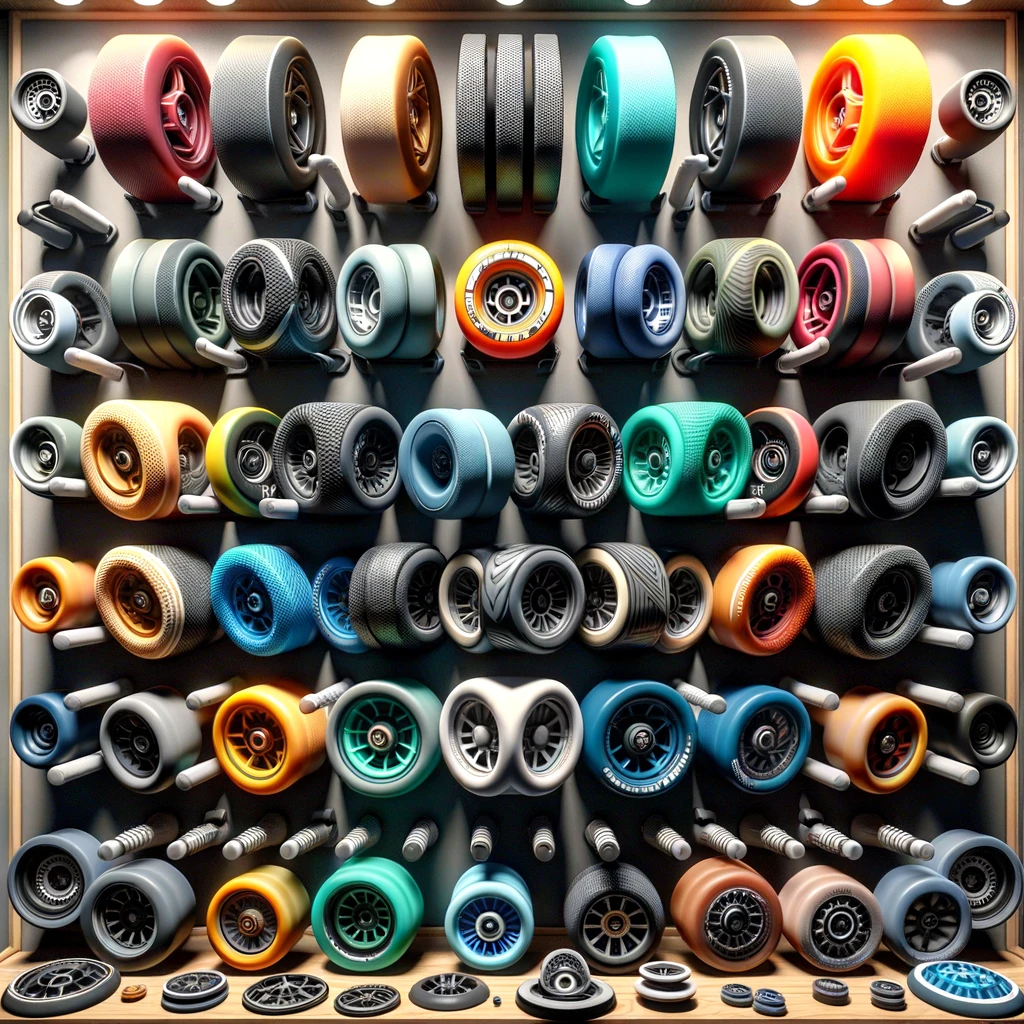Table of Contents
Table of Contents
Introduction
The heart of a great inline skating experience lies in understanding one important component: skate wheel hardness.
It’s this attribute that significantly impacts your performance, influencing everything from speed and grip to durability and comfort.
Whether you’re weaving through city streets, performing in a rink, or gliding along a park path, choosing the right wheels for your skating style is paramount.
Key Takeaways:
- Wheel Hardness is Crucial: The durometer (A value) of your skate wheels significantly affects your skating experience, influencing grip, speed, and wear resistance. Understanding and choosing the right hardness is key to matching your skating style and terrain.
- Size Matters: Wheel diameter impacts stability and manoeuvrability. Smaller wheels offer agility for tricks and tight turns, while larger wheels provide speed and smoothness for long-distance skating.
- Profile Shapes Performance: Whether flat, curved, or bullet, the wheel profile affects your speed and stability. Choose based on your preference for grip versus manoeuvrability.
- Rebound for Responsiveness: High rebound wheels offer better acceleration and a smoother ride, enhancing your overall skating experience.
- Adapt Wheel Hardness to Skating Style:
- Aggressive Skating: Opt for small, hard wheels (88/90A) for durability during jumps and grinds.
- Recreational/Fitness Skating: Medium-hard wheels (78–84A) provide a balance of comfort and versatility.
- Speed Skating: Large, medium-hard wheels (78–85A) maximize speed and efficiency.
- Hockey Skating: Medium, softer wheels (72–74A) ensure agility and quick turns.
- Consider Your Skating Environment: Softer wheels are preferable for rough or uneven surfaces due to their grip and vibration absorption, whereas harder wheels are suited for smooth surfaces where speed and durability are priorities.
- Quality and Specifications Matter: Always compare wheels of similar quality for a fair assessment. Two wheels with the same hardness rating might perform differently based on their brand, model, and material quality.
- Informed Selection Leads to Enhanced Performance: Weigh factors like your weight, the typical skating surfaces, and your preferred skating dynamics when choosing wheel hardness. This informed approach ensures a better match to your personal skating style and needs.
- Maintenance Extends Wheel Life: Regularly check, clean, and rotate your wheels to maintain optimal performance and extend their lifespan, regardless of hardness.
NEMONE Mermaid 4 Size Adjustable Light up Roller Skates for Girls, Purple Blue Skates for Toddlers, Beginner Kids Roller Skates Indoor Outdoor
(as of 07/25/2024 14:17 GMT +01:00 - More infoProduct prices and availability are accurate as of the date/time indicated and are subject to change. Any price and availability information displayed on [relevant Amazon Site(s), as applicable] at the time of purchase will apply to the purchase of this product.)Understanding Wheel Characteristics
Diameter (Size)
The size of your skate wheels, measured in millimeters (mm), directly affects your stability and maneuverability.
Smaller wheels (50mm to 72mm) offer increased agility, perfect for intricate footwork and tricks, while larger wheels (up to 110mm) enhance stability and speed, making them ideal for long-distance skating.
Profile
The shape of the wheel’s contact surface can be flat, curved (round), or bullet (pointed).
Flat profiles provide a stable ride with maximum grip, whereas curved and bullet profiles, designed for speed, reduce friction and improve manoeuvrability.
Rebound
Rebound refers to a wheel’s ability to return to its original shape after being compressed.
High Rebound (HR) wheels bounce back quickly, offering excellent acceleration and a smooth ride.
Super High Rebound (SHR) and Ultra High Rebound (UHR) wheels take this a step further, enhancing your speed and comfort on the move.
Hardness (Durometer)
Measured on the A scale, the hardness of inline skate wheels ranges from 68A (soft) to 90A (hard).
Soft wheels provide better grip and absorb more vibration, making them suitable for rough surfaces.
In contrast, hard wheels offer increased durability and speed on smooth surfaces.
Decoding Durometer Hardness
Higher A Value
Harder wheels are more durable and create less friction, leading to faster speeds. However, they offer less grip due to their smaller contact area with the ground.
It’s important to match wheel hardness to your skating environment for optimal performance.
Matching Quality
It’s important to note that hardness comparisons are most valid among wheels of similar quality and specifications.
Two wheels with the same hardness rating but from different brands or lines may perform differently.
Examples
- 88/90A: Ideal for aggressive skating, these hard wheels withstand the wear and tear of grinds and jumps.
- 78–84A: The go-to range for recreational and fitness skating, offering a balance of grip and speed.
- 78–85A: Preferred for speed skating, where large, medium-hard wheels facilitate quick, efficient movement.
Choosing Wheels for Different Skating Styles
Aggressive Skating
Requires small, very hard wheels (42–72mm, 88/90A) to handle the rigors of jumps and grinds.
Recreational/Fitness Skating
Benefits from large, medium-hard wheels (70–90mm, 78–84A) for an all-around good ride on various surfaces.
Speed Skating
Demands very large, medium-hard wheels (90–100mm, 78–85A) for maximum efficiency and speed over distances.
Hockey Skating
Uses medium, relatively soft wheels (72–80mm, 72–74A) for quick, agile movements and tight turns.
Roller Derby Firestar Youth Skates for Girls, Boys, Beginners, Kids
(as of 07/25/2024 14:17 GMT +01:00 - More infoProduct prices and availability are accurate as of the date/time indicated and are subject to change. Any price and availability information displayed on [relevant Amazon Site(s), as applicable] at the time of purchase will apply to the purchase of this product.)Practical Tips for Wheel Selection
Consider your weight, preferred skating style, and the typical conditions of the surfaces you skate on when selecting wheel hardness.
Always check the existing wheel specifications or the surface for hardness information before making a purchase.
Remember, softer wheels may be slower but offer superior grip, making them ideal for unpredictable or rough surfaces, while harder wheels excel in speed and are best suited for smooth, predictable terrains.



